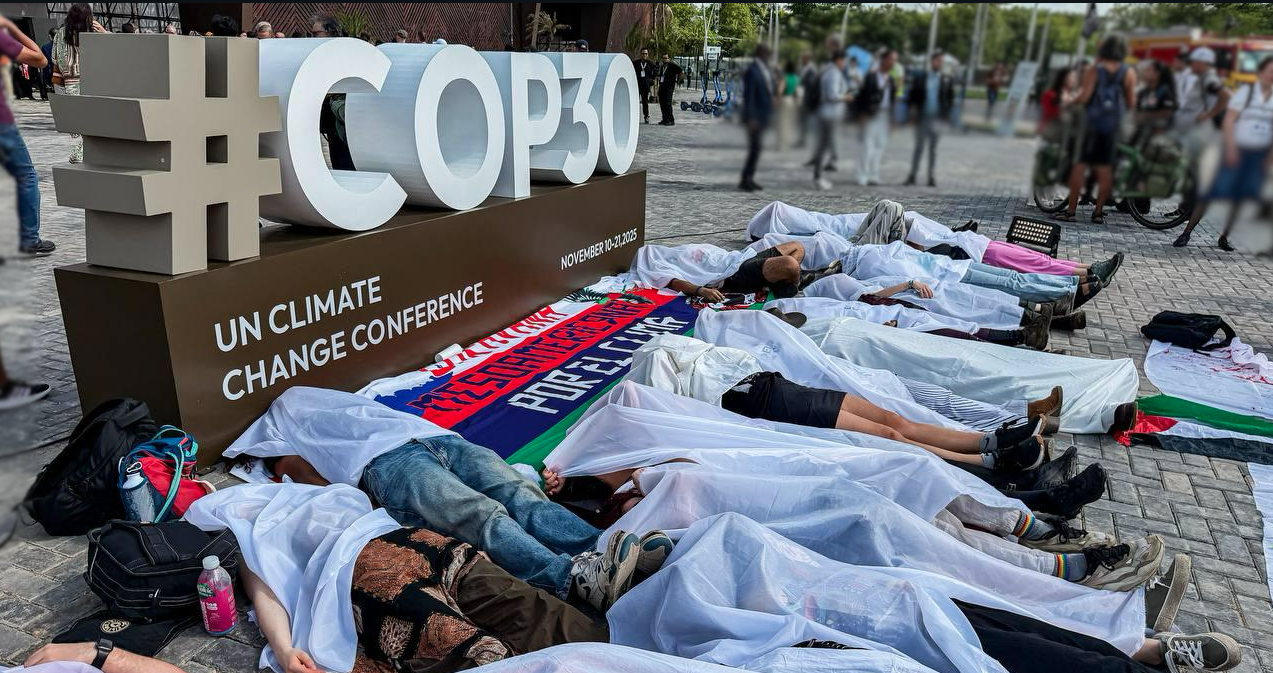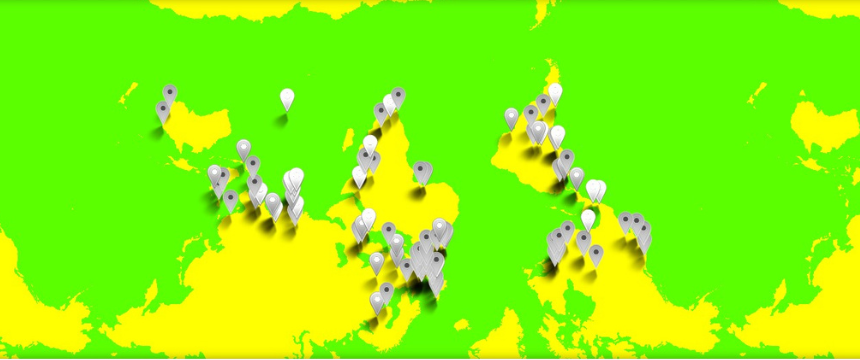Formed in the wake of the International Degrowth Conference 2024 in Pontevedra - following an intervention by Luisa Emilia Reyes Zúñiga - the Delinking & Degrowth Collective convenes organisers, scholars, practitioners, and learners from around the world, within and beyond the degrowth community. Meeting monthly and coordinating via a shared WhatsApp hub, the collective uses leverage from within the imperial core to centre, support, and strategise with the demands of the Global South, and the marginalized.
As a space for collective knowledge generation, intervention, strategy and mobilisation, it identifies concrete points of entry to advance degrowth for delinking in the service of Global South sovereignty. The collective participated at the ISEE–Degrowth Conference 2025 in Oslo, where it presented a special session, aside from a parallel Degrowth & Delinking Tent and it collaborates with the Global South Working Group Circle, which aids in steering its agenda in the International Degrowth Network. The special session was divided into three segments - below is part one: The Delinking Overview, presented by Sara al Mahdi which set the stage for the discussions and segments that followed.
“I want to open with a simple observation about how we do economics. Too often we collapse the world into either the solitary individual or the isolated nation-state and then wonder why our models fail to explain anything beyond those narrow frames.
The late Samir Amin urged us to begin elsewhere - with structure, history, and power. It is that method, more than any single theorem, that can rescue development economics from its eurocentric rut and help us understand why degrowth, in its current form, will be inadequate for the rest of the world.
Degrowth is having its moment: budding conferences, climate assemblies, doughnut diagrams, and earnest calls to “live simply” and “work less.” For the majority world - the lands whose resources, labor and cultures subsidise European comfort - this conversation can feel profoundly underwhelming and also violent. If degrowth is to become a project of collective liberation rather than a regional lifestyle choice, it must be braided together with a practice the Global South has discussed for decades: delinking.
Delinking is often mistaken as self-imposed isolation. Samir Amin - whose work many have built on and extended in contemporary political economy - was explicit: “To delink is not to move to the moon; it is to refuse a development path written elsewhere.”
I like to think of it as three refusals and one embrace:
1. Refusal of structural subordination – breaking the chains that tether Southern wages, crops, and currencies to Northern accumulation.
2. Refusal of temporal myopia – reading present crises through the long history of colonial extraction, from Bandung 1955 to Palestine 2025.
3. Refusal of epistemic obedience – rejecting theories that paint European/western experience as universal law.
4. Embrace of people-centred, auto-directed development – rebuilding economies around collective needs, not corporate balance sheets.
Let me briefly expand on Amin’s four habits of mind - structural, temporal, political, and creative - and speak to our moment:
First, structure: The global economy is not a level playing field; it is a set of core–periphery relations stitched together by unequal exchange. Trade rules, supply chains, and even the metrics we teach undergraduates are built to keep Southern labour cheap and Northern consumption cheap-er. Second, time and temporality: Colonial supply routes do not vanish; they mutate. Yesterday’s sugar plantations reappear today as lithium corridors and carbon-offset forests. Without that long view we confuse new packaging for new practice. Third, politics: Social science is never neutral. Choosing a model is choosing a side. Pretending otherwise merely keeps the side with the missiles, patents, and credit ratings in charge. Finally, creativity: Yes, begin with Marx on exploitation, but extend the analysis with feminist, ecological, and anticolonial lenses. Using those lenses, delinking becomes a living strategy rather than a slogan.
Against that backdrop, Amin proposed what he called delinking. The term is often caricatured as a retreat into self-sufficiency. In fact, he described it as “refusing to submit national-development strategy to the imperatives of globalisation.” Delinking is relational, not isolationist: it severs the channels through which imperial power siphons value and opens new channels built on reciprocity and popular need.
At the national level it means subordinating external ties to internal development - deciding, for instance, that food sovereignty matters more than WTO-compliant cash crops. Regionally it echoes Bandung: neighbors trading technology, culture, and credit on their own terms. Globally it means rewriting and also rejecting the rules that the IMF, the World Bank, and the G7 still enforce at gunpoint when diplomacy fails.
Here is the heart of the matter: the South is not poor. It is systematically impoverished. It possesses fertile land, abundant labour, and the bulk of the planet’s critical minerals, yet it lacks sovereign control over these capacities.
Three immediate steps follow:
First, cut strategic import dependence - especially where it hands pricing power to the core.
Second, build sovereign industrial capacity geared to social use rather than OECD supply chains.
Third, mobilise public finance - capital controls, developmental banks, job-guarantee schemes - to put idle labour and resources to work for domestic goals.
Examples abound, even if unevenly. Iran’s barter arrangements under sanctions, the wave of re-nationalisations in parts of Latin America, the stubborn cooperatives of Gaza that rebuild even under bombardment, and the BRICS+ experiments with non-dollar settlements - all point to cracks in what once looked like an unbreakable wall.
Meanwhile, degrowth has become fashionable in Europe. Citizens talk about living within limits, and that is welcome. But if European degrowth does not confront its imperial metabolism, it risks becoming eco-austerity for the rest of us: Europe tightens its belt while still dining on Congolese cobalt and Brazilian soy. A truly global degrowth must therefore dismantle extractive contracts, cancel odious debts, transfer technology under Southern control, and - let us be frank - end the military industrial complex. USA, EU & Israel’s ongoing devastation of Palestine is how resource flows are controlled. A Degrowth that ignores the military industrial complex is moral theatre.
What we’re witnessing in Palestine today is a genocide - it’s also the violent enforcement of the global capitalist order. Israel’s occupation, backed materially by the US, UK, EU, Australia and Canada, is a frontline of imperial control: control over land, borders, resources, and resistance. Delinking means breaking dependency on that imperialist core. It’s not just about economic autonomy - it’s about political, cultural, and military sovereignty. For Palestine, delinking means dismantling the entire system that allows Israel’s settler-colonial project to be armed, funded, and legitimised.
Gaza is under total siege, made possible by global supply chains, military aid, and financial complicity. International institutions meant to uphold law are enabling genocide in what can only be called structural dependance.
To free Palestine, we need more than ceasefires. We need:
• Delinking from Zionist capital and military supply chains;
• Cutting the flow of imperial financing and ideological cover;
• Global South solidarity economies, where Palestine isn’t forced to depend on aid from colonial donors;
• And cultural delinking - rejecting the narrative frameworks that frame resistance as terrorism.
Delinking isn’t abstract. It is material. It means resisting the economic and ideological machinery that makes genocide profitable and normalized.
We are, all of us, living through system failure. The capitalist world-system and the liberal political order cannot provide material security to the majority, nor stay within planetary boundaries. Its legitimacy is eroding. In that turbulence, Southern struggles for autonomy are the decisive agents of transformation. The North’s duty is clear: de-centre itself, relinquish imperial privilege, and become a genuine partner in building a multipolar, ecological civilisation. Remember: we are not a minority. The peoples of Asia, Africa, Oceania, and Latin America constitute eighty-five per cent of humanity and an even greater share of the future. If we organise, if we delink, if we pair Northern degrowth with Southern sovereignty, we can redirect the planet’s abundant resources away from imperial accumulation and toward collective flourishing.
This generation of the global north must mobilise to make this pivot - not as charity, but as the only viable path to ecological survival and universal dignity."

Debt for Climate went to the COP30 to carry a specific, tangible proposal with the potential to address systemic change: debt cancellation. Considered a degrowth-leaning policy, this proposal refers to the partial or total deletion of debt contracted by a government. Read the interview.

In support of a fellow movement aligned with degrowth, we are republishing this declaration of the Global Tapestry of Alternatives which was originally released on June 13th.

Will degrowth as a discourse and movement extend coloniality, by aiming to make just one world out of the many that form the earth’s pluriverse? Or will degrowth be decolonial, by helping to sustain and grow a many worlds world in which diverse ways of living and relating can thrive? These are the questions we ask in this brief essay.